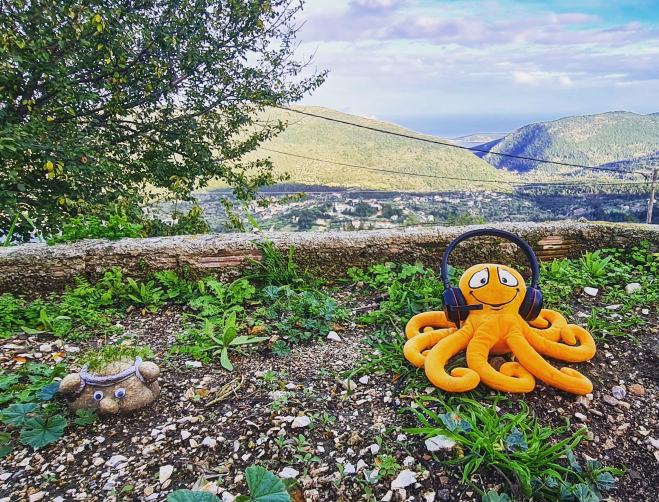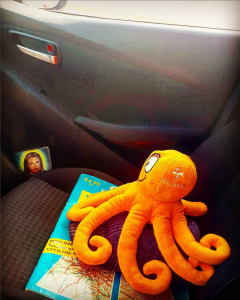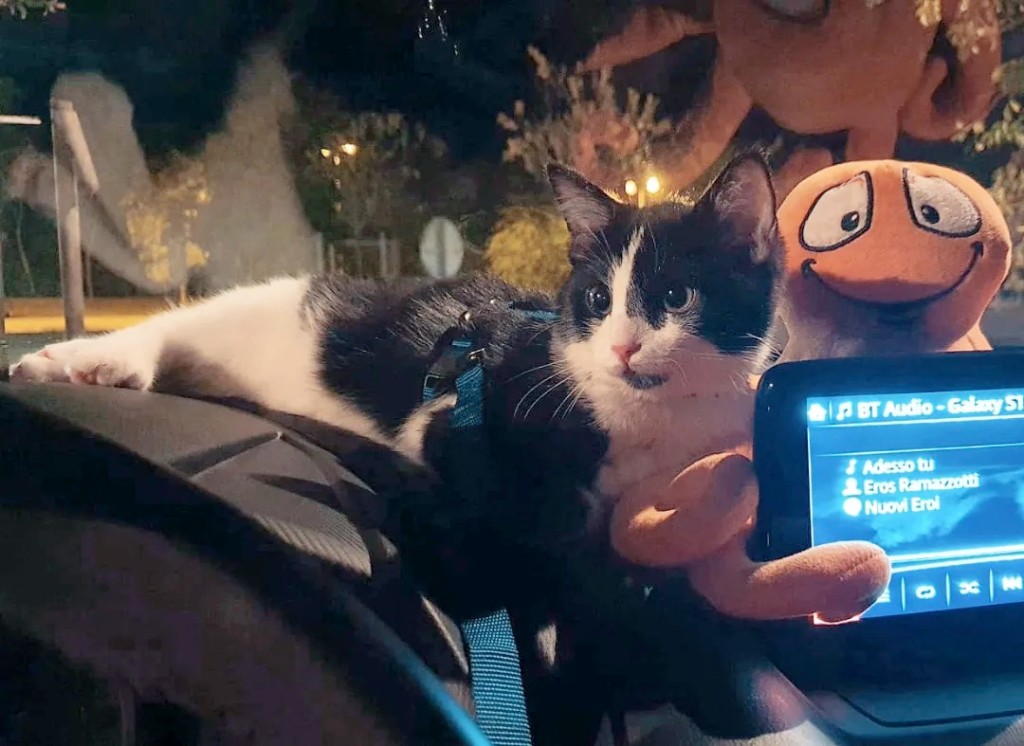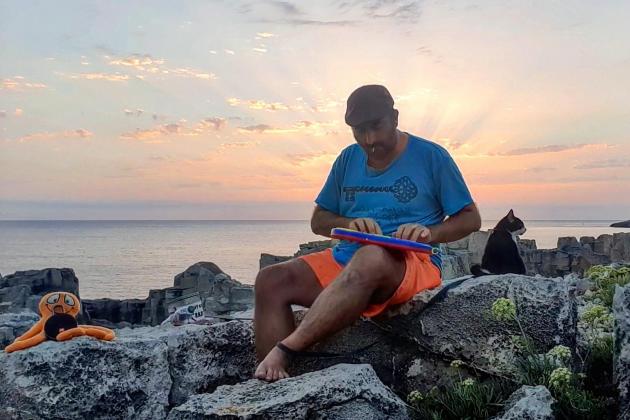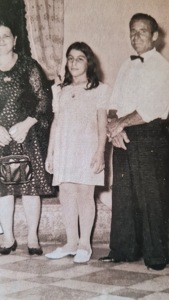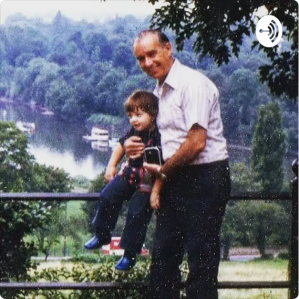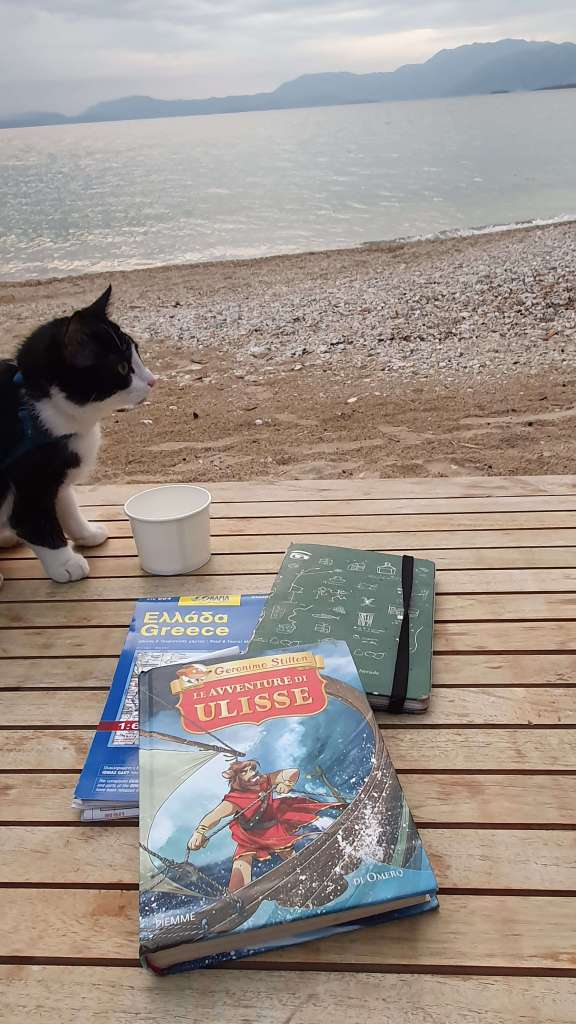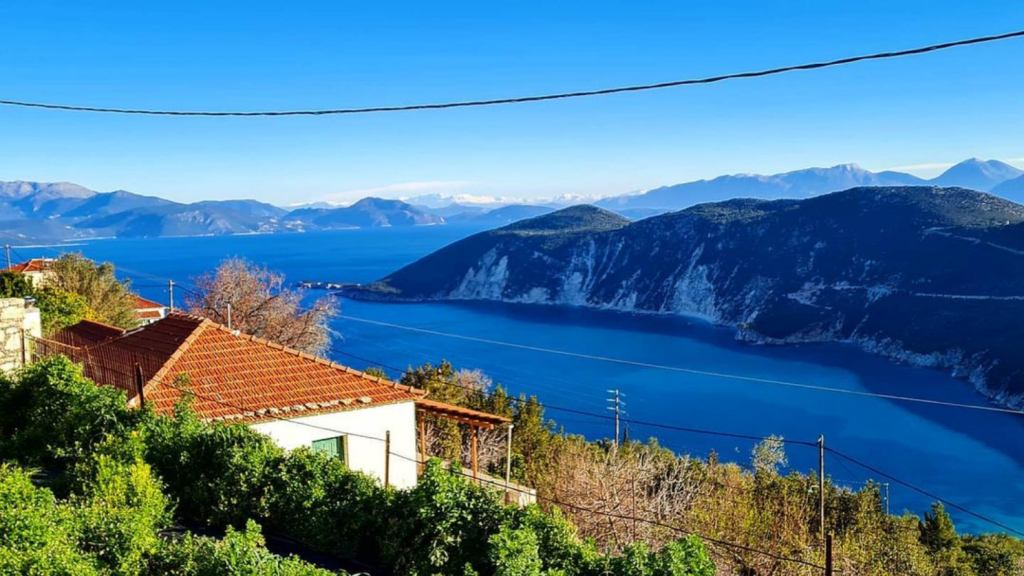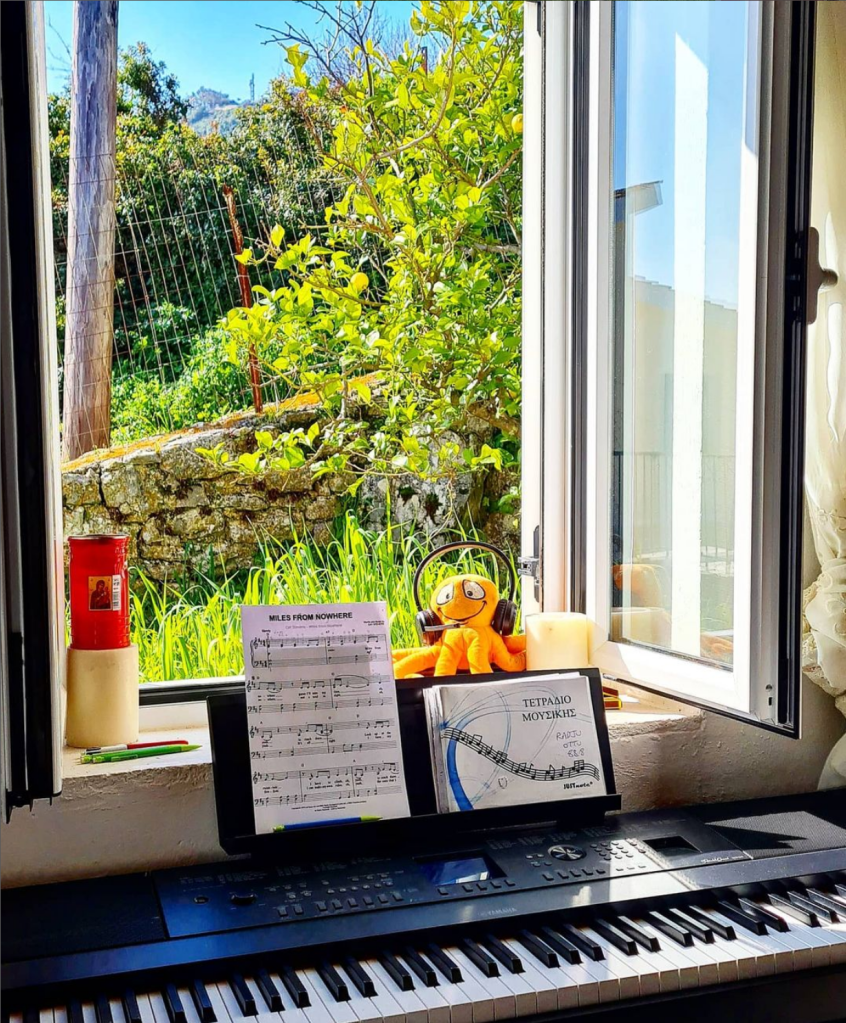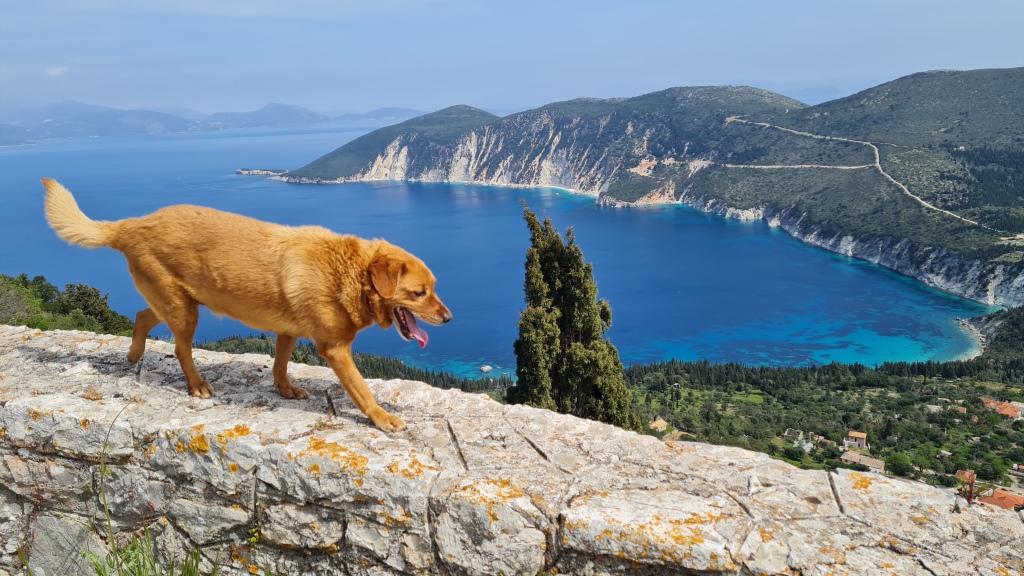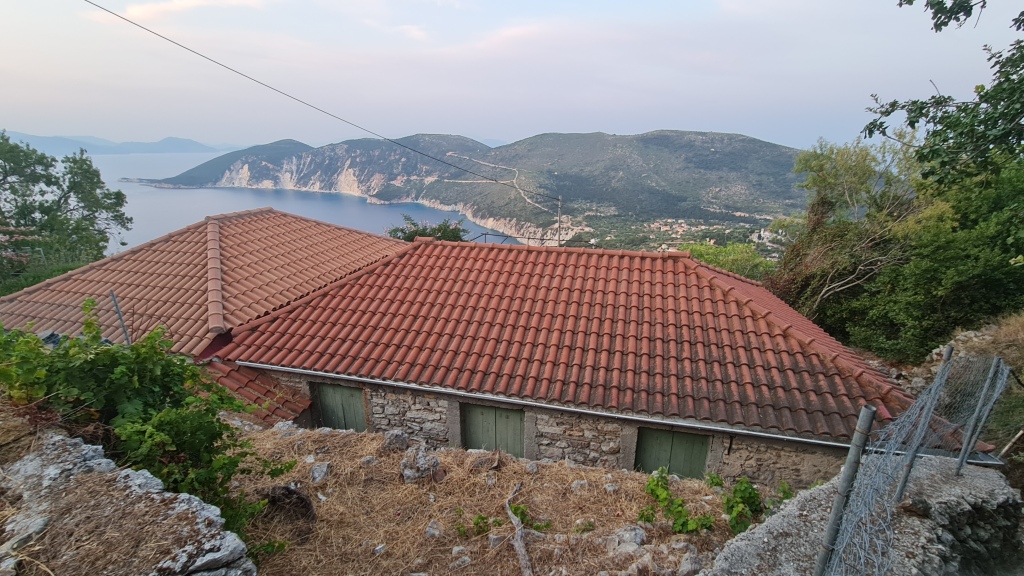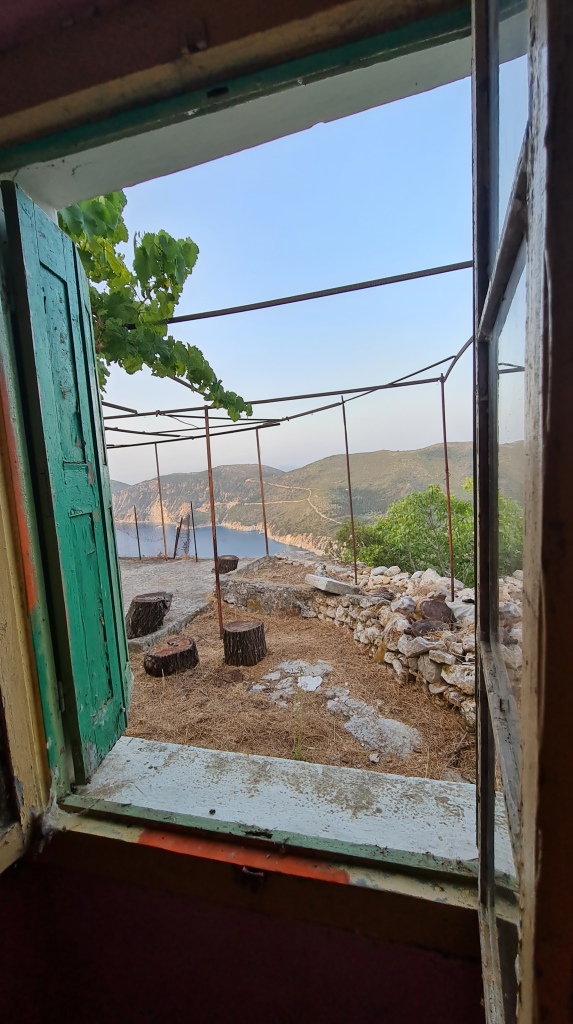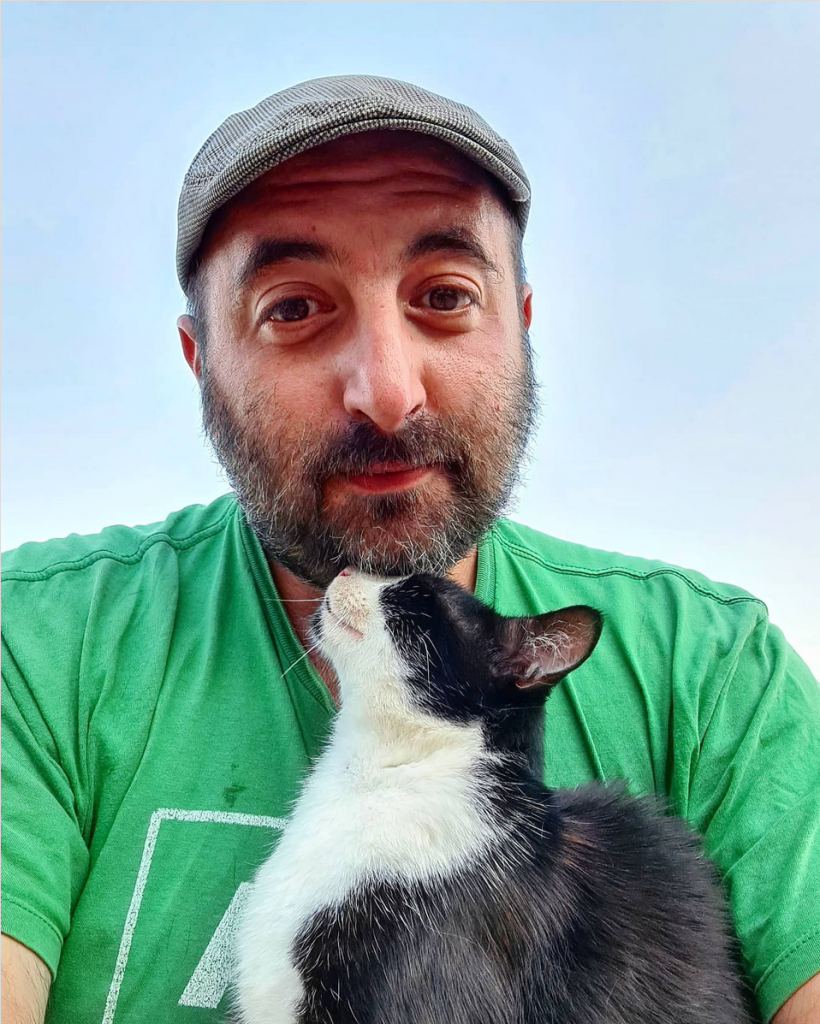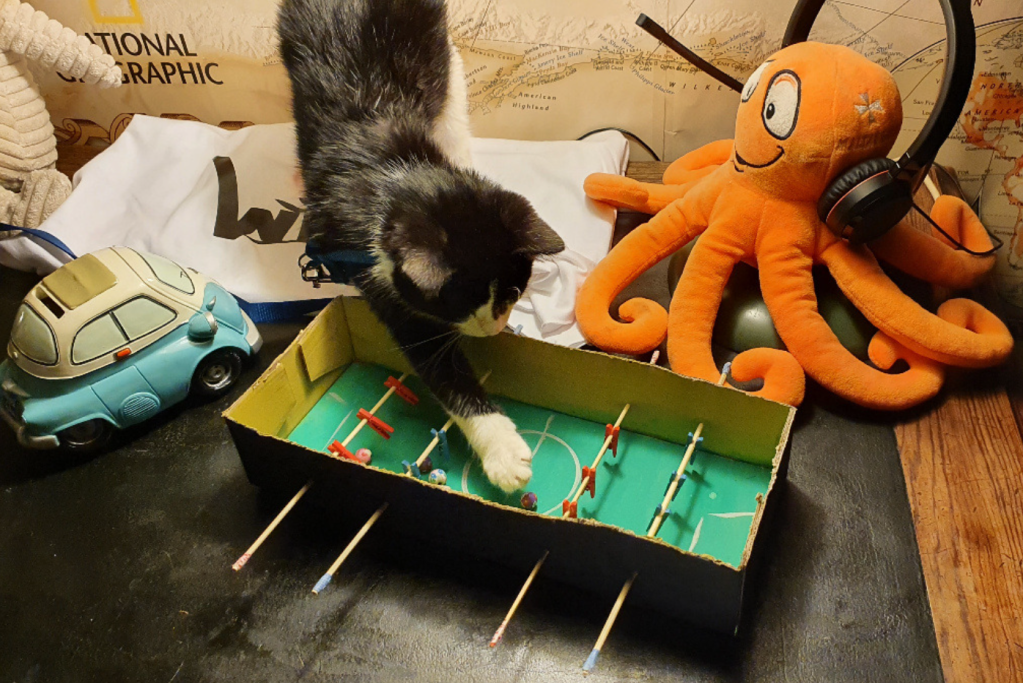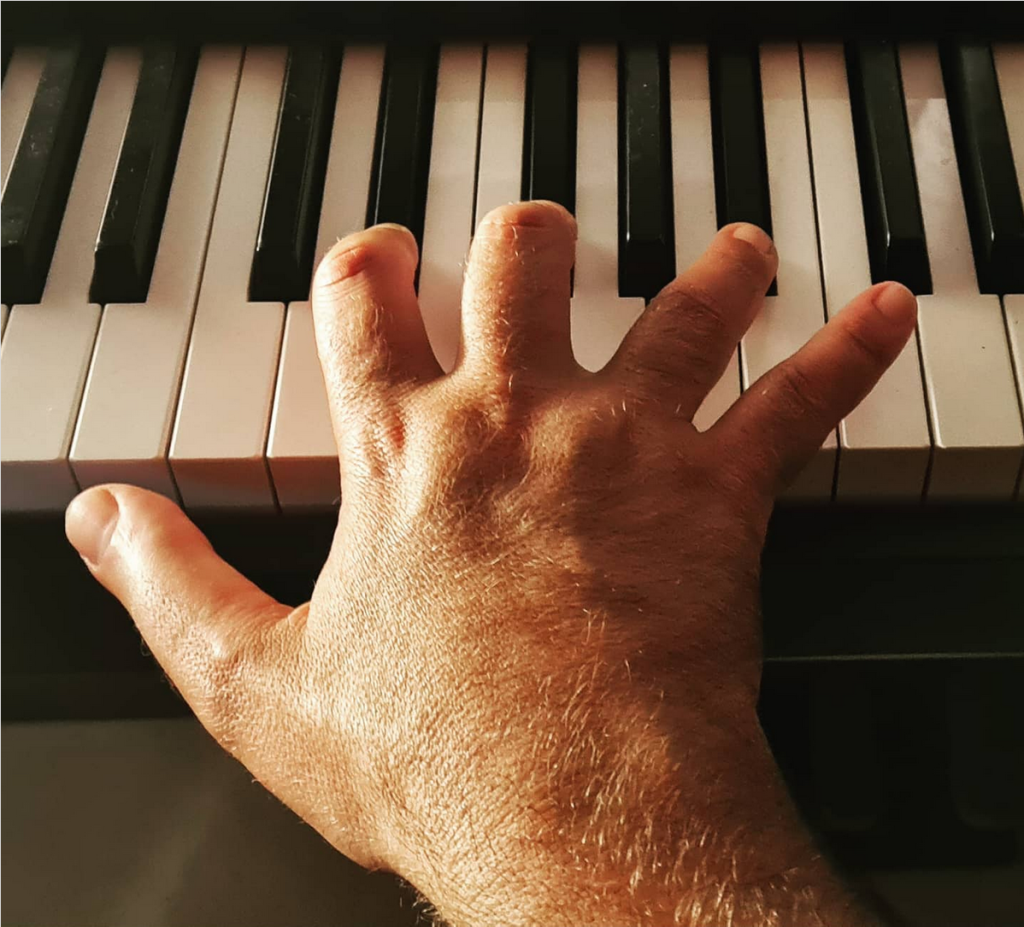What happened to Ottu?
A story as long and winding as his bright orange tentacles. Here it is in brief.
Ottu and I first met at Wied iż-Żurrieq, in early summer 2019. He was supposed to be a gift for Silvia. After accompanying us on a road trip from Bratislava to the Croatian islands and back, I forgot to take him out of the car, and he thus ended up on the front seat, all the way down to Malta and later up to Luxembourg. For the following year, Ottu lived on my mapmaker’s desk in Bonnevoie.
Fast forward to the tectonic shock of the pandemic. Ottu kept me sweet company during lockdown in Bonnevoie, and became my DJ through the long chilled nights, as I slowly but surely (yet unknowingly) slipped into bipolar mania. The poems I wrote during those first two months will appear soon in Luxembourg as Ottu at the Window, published by D’Bréck, illustrated by Veronika Borissova, with a preface by José Luís Correia.
In late July, once the borders were open, DJ Ottu, three-month-old Don Pablo (mi gatito madrileño, brought to me by Rafa on my 42nd birthday), and myself got into the car and started to drive south. We couldn’t travel to Malta, for reasons. Instead, we were supposed to reach Salento within three days; the journey took us an entire month. The story of that harrowing, noisy yet at times exciting (mis)adventure will eventually be another book, Don Pablo on the Road.
We lived in the wondrous village of Santa Cesarea for a few weeks, and planned to stay long-term, at least until the virus fear subsided and we could drive home to Qrendi. Don Pablo loved it in Santa Cesarea. We made some good friends at Bar Moresco, and I started to plan a Mediterranean library next door.
Yet my bipolar mania was reaching its heights, as DJ Ottu, Don Pablo and I spent long nights and daybreaks on the rocks by the sea, chilling to music, reading aloud, recording videos for friends, podcasting. I couldn’t keep up with myself, and had to channel my energy as creatively as I could. At times I would stare at the stars, particularly the Orion Belt, which together with Betelgeuse, Rigel, and Sirius forms a cross rising in the south-east. I began to hallucinate, or rather, to put eight and eight together in my crazy, winding thoughts.
Santa Cesarea lies exactly on Saint Michael’s Ley Line, which begins in Skellig Michael, Ireland and travels south-east to the Stella Maris monastery on Mount Carmel, Jerusalem. For months, since the outbreak of the pandemic, my ears were slowly becoming hyper-sensitive, and I could feel the presence of my Nannu Frank, who I remember having similar hearing problems when I lived with him for a time as a boy. I could also sense the company of Zija Kelina, who passed away suddenly when I was 3, and had visited me more than once since then. On the limestone rocks of Santa Cesarea, I understood that Ottu, Don Pablo and I had to continue travelling, all the way to Jerusalem. In order to send two important video messages to my family, of courage and forgiveness, on behalf of Zija Kelina and Nannu Frank.
And so we crossed the Ionio to Greece, on the night of Hurricane Ianós which was raging further south. We were supposed to pass via Athens, to meet Dimítri and organise a spontaneous bookstand-protest against the government’s sudden cancellation of all cultural events in Greece (but not touristic activity, of course). After that we should have sailed to Cyprus, and from there to Yaffa, an hour’s drive away from Jerusalem.
But on the fourth day in Greece, still on the western coast, my ears finally burst. I stepped out from a newsagent’s, to a weirdly-shaped crossroads, and all of a sudden, every motorbike, every car ignition, a large tv showing basketball outside a kafeineío, children’s voices, anything and everything felt twenty times louder. I don’t know how I managed not to collapse to the ground – probably because Don Pablo was with me. I called my doctor in Luxembourg, she instructed me to visit an ear specialist she had identified in Athens. Yet Athens was now out of the question. Even that seaside village of 4,000 people was too strident. Don Pablo, Ottu and I desperately needed to find refuge on an island.
After waiting out a three-day storm, we sailed to hurricane-battered Ithaca, to begin a new life, away from the noise of civilisation. As the (extremely loud) ferry was leaving harbour, my shattered mobile finally died for good, and I changed my name to Michel, after Zija (Mi)Kelina. For a while, Don Pablo’s name was Odysséas. How we ended up in the mountain village of Exogí (which literally means “Out of this land/world”) three days later, thanks to the kindest of souls, is another magical story, for another time. There we found peace, Don Pablo was released from his leash, and DJ Ottu became my piano teacher. Months later, when the pandemic and lockdowns began to let up, I finally received medical help, and slowly started to heal.
After our first year in Exogí, the other extreme of bipolar disorder – fathomless depression – began to set in. For nine months, I had no desire to read, write, play piano or listen to music, let alone communicate. I spent most of the days lying in bed. I had adopted Pepe, a very calm grandfather dog from Lésvos, which at least forced me to take him for walks around the village, at its most astonishingly scenic in the winter. My Exogí friends had left for the mainland; every couple of days I would visit my aderfós Kostáki at the supermarket in Stavrós, the village in the valley. My hearing, amid all that silence, was getting better – finally I could drive without the construction headphones sent to me by my dear friend Zvez -, and I started to plan the return to Malta. With such little energy, it took me around three months to pack.
As I was no longer listening to music and left the piano to gather dust, DJ Ottu fell into deep radio silence. When deciding what little to take with me – I had to drive to Luxembourg first, to sell the car, then fly to Malta from there -, all of my books, clothes, keepsakes filled me with shame for the sheer amount of (at times hurtful) noise I had made, online and off, during the extended manic episode. I threw many things away, even some of my most cherished books. Ottu, if he is still whole, is now in or under a ‘retirement home’ for discarded objects, on the central isthmus of Ithaca, facing Kefaloniá.
Don Pablo, who quickly became a mountain cat climbing trees and hunting birds, remains in Exogí, and I will see him again in four days. He visits the tavérna regularly, and is surrounded by friends both feline and human (ευχαριστό παρά πολύ, Γιάννι και Δήμα). Two years after leaving, I am returning to Exogí to sell a little house I bought on a path far from traffic, to collect the books and notes I (thankfully) didn’t throw away, and to catch up with the friends and good people who helped us and kept us company. Even after selling the spitáki, I will still visit Exogí in future.
Once I sell it, I’ll be a step or a leap closer to opening a Mediterranean poetry library in or near Qrendi. The name: Dar Don Pablo. ‘Dar’ means house or home; even if Don Pablo stays in Exogí (as he should, rather than moving to treeless Malta…), the library will still be named after him. He is named, in turn, for my Nanna Pawla and Don Pablo Neruda.
Ottu, meanwhile, who I hope will forgive me, will be in the name of the book(s) – Radju Ottu 88.8. A contemporary bipolar odyssey, mixed-genre (poetry, prose, and a little piano), in English and Twanniż, a Mediterranean language the reader will learn as they go along. The story should also raise awareness of hyperacusis. I need to finish a different book first, on maps and solitude, hopefully this year. Bil-pass il-pass. Onza onza. Βήμα βήμα. Step by slow, stable step.
